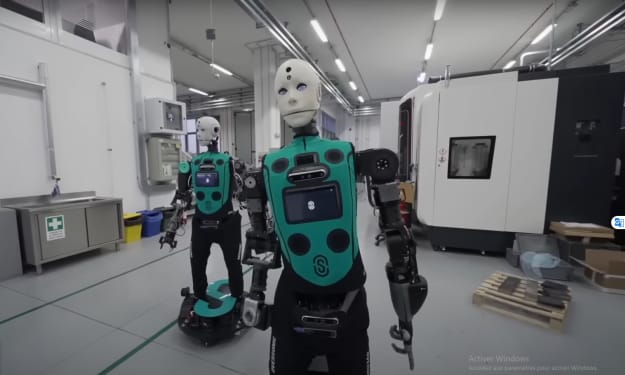AI's Quest to Replace The "Median Human": Unveiling The Future of Artificial Intelligence
The Median Human Dilemma: Sam Altman's Controversial Vision

In the tech world, the term "median human" has been making waves and stirring debates. Sam Altman, the CEO of OpenAI, is at the center of this controversial concept. He envisions AGI (Artificial General Intelligence) as an entity equivalent to a "median human." But what does that mean, and why is it causing such a stir?
Altman's vision is to create AI with the cognitive abilities of an average human employee. He believes that AGI could perform tasks as diverse as being a doctor or a skilled coder, all from behind a computer. This ambition might sound impressive on the surface, but it's raising important questions about the impact of AI on the workforce and the very essence of human intelligence.
The use of the term "median human" is not limited to Altman; it has permeated AI discussions, from tech blogs to influential AI models like GPT-4. This subheading will delve into the concerns and criticisms surrounding this idea, including the notion that comparing AI to the median human is not only offensive but also an oversimplification of human intelligence.
AI's Journey Toward the 'Median Human' Benchmark
As the tech world grapples with the implications of AI striving to match the abilities of the median human, there's an ongoing quest to define and quantify this benchmark. This subheading will explore the various perspectives and challenges associated with measuring AI against human capabilities.
Experts like Henry Shevlin, an AI ethicist and professor at the University of Cambridge, emphasize the need for sensitivity in discussions about AI and human intelligence. While quantifying AI performance in areas like chess or coding is well-established, defining AI in terms of general human intellect is ethically complex.
Brent Mittelstadt, director of research at the Oxford Internet Institute, points out the lack of concrete measurable comparisons of human intelligence within AI research. The term "median human" is criticized for being intentionally vague and disconnected from a specific, grounded meaning. This subheading will unravel the intricacies of defining the "median human" in the context of AI development.

The Ethical Dilemma: AI, Human Intelligence, and Agency
The use of the term "median human" in AI discussions raises fundamental ethical questions. This subheading will explore how comparing AI with human intelligence can blur the lines between machine and human cognition, impacting the perception of AI's capabilities.
Mittelstadt highlights the problematic nature of directly equating AI performance with human capabilities and intelligence. It can lead to the assignment of agency, comprehension, cognition, and reasoning to mechanistic AI models, which raises ethical concerns.
The subheading will also touch upon the historical context of scientific racism in quantifying intelligence and why such comparisons should be approached with caution. It will highlight the need for ethical discussions when determining the role of AI in our future, especially as technology continues to advance at a rapid pace.
Navigating the Complex Future of AI and the 'Median Human' Benchmark
The concept of AI striving to achieve the cognitive abilities of a "median human" is a topic that has captured the imagination and concern of the tech world. Sam Altman's vision for AGI, which could perform tasks ranging from medical practice to coding, has sparked intense debates and raised important ethical questions. This notion, however, is not limited to Altman alone, as discussions about the "median human" have permeated AI-related discourse.
As we've explored, the challenges of quantifying AI against human intelligence are significant. The "median human" remains an elusive benchmark, often criticized for its vagueness and the potential oversimplification of human cognitive abilities. Notably, the direct comparison of AI performance to human capabilities can blur the lines between machine and human cognition, raising ethical concerns about the role of AI in our future.
The history of scientific racism, the pitfalls of equating AI with human intelligence, and the potential for misinterpretation underscore the need for nuanced, ethical discussions. It is imperative to approach these discussions with sensitivity and a deep understanding of the complexities involved in the development of AI.
The future of AI is undeniably exciting, offering unprecedented possibilities to enhance various aspects of our lives. However, it is essential to keep in mind the ethical implications and the need for a thoughtful, well-informed approach. The "median human" concept serves as a reminder that as technology advances, we must tread carefully, ensuring that AI and human intelligence can coexist harmoniously.






Comments (1)
Well written and well-informed. Only time will confirm whether AI can beat human intelligence or not but its implications have become a matter of great debate.